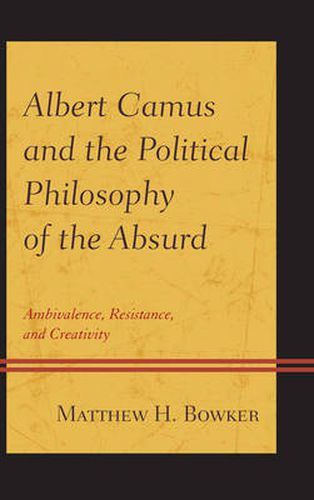Readings Newsletter
Become a Readings Member to make your shopping experience even easier.
Sign in or sign up for free!
You’re not far away from qualifying for FREE standard shipping within Australia
You’ve qualified for FREE standard shipping within Australia
The cart is loading…






This book demonstrates that Albert Camus’ concept of absurdity is best understood when decoupled from what might be called its ontological aspirations. Rather than pretend that absurdity usefully describes ‘the human condition,’ ‘the silence of god,’ ‘the deprivation of transcendence,’ or ‘metaphysical revolt,’ I argue that, for absurdity to be a fruitful idea, it must be approached as a psychological disposition and its basic tenets must be translated into phenomenal and psychological language. The book defines the particular psychological disposition of absurdity by analogizing it with the constructs of ambivalence, integration, conscious resistance, and creativity. Its central contention is that absurdity may be interpreted as a kind of ambivalence and, thus, as an aspect of psychological experience that demands a creative and mature response.
Absurdists’ cries of spiritual anguish need not persuade us that the conditions of loss, terror, alienation, and deprivation they describe are objectively ‘real’. If, instead, descriptions of absurdity may be understood as psychological accounts of the powerfully ambivalent impulses toward merger and toward separateness, toward group-immersion and toward subjectivity, then absurd revolt involves recognizing, resisting, and integrating such impulses in order to facilitate mature ethical action. It may be possible, I argue, by examining the dynamics of absurdity, ambivalence, resistance, and creativity, to develop a new grounding for an absurd political morality. This book asks what unique properties and advantages this renewed political morality offers and applies this grounding to some of the political and moral crises of Camus’ time and of our own.
$9.00 standard shipping within Australia
FREE standard shipping within Australia for orders over $100.00
Express & International shipping calculated at checkout
This book demonstrates that Albert Camus’ concept of absurdity is best understood when decoupled from what might be called its ontological aspirations. Rather than pretend that absurdity usefully describes ‘the human condition,’ ‘the silence of god,’ ‘the deprivation of transcendence,’ or ‘metaphysical revolt,’ I argue that, for absurdity to be a fruitful idea, it must be approached as a psychological disposition and its basic tenets must be translated into phenomenal and psychological language. The book defines the particular psychological disposition of absurdity by analogizing it with the constructs of ambivalence, integration, conscious resistance, and creativity. Its central contention is that absurdity may be interpreted as a kind of ambivalence and, thus, as an aspect of psychological experience that demands a creative and mature response.
Absurdists’ cries of spiritual anguish need not persuade us that the conditions of loss, terror, alienation, and deprivation they describe are objectively ‘real’. If, instead, descriptions of absurdity may be understood as psychological accounts of the powerfully ambivalent impulses toward merger and toward separateness, toward group-immersion and toward subjectivity, then absurd revolt involves recognizing, resisting, and integrating such impulses in order to facilitate mature ethical action. It may be possible, I argue, by examining the dynamics of absurdity, ambivalence, resistance, and creativity, to develop a new grounding for an absurd political morality. This book asks what unique properties and advantages this renewed political morality offers and applies this grounding to some of the political and moral crises of Camus’ time and of our own.